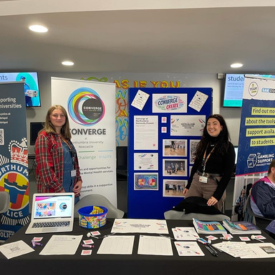-
Study
Study
Interested in studying at Northumbria? With 31,500 students, Northumbria is one of the largest universities in the country, offering courses on either a full-time, part-time or distance learning basis.
Discover more-
Undergraduate
- Undergraduate Study Degree
- Undergraduate Open Day & Events
- Application Guides
- Northumbria University UCAS Exhibitions
- Foundation Years
- Undergraduate Fees & Funding
- School & College Outreach
- Continuing Professional Development
-
Postgraduate
- Postgraduate Study Degree
- Postgraduate Research Degrees
- Postgraduate Open Days and Events
- Postgraduate Fees & Funding
- Flexible Learning
- Thinking about a Masters?
- Continuing Professional Development
- Change Direction
-
Student Life
- The Hub - Student Blog
- Accommodation
- Life in Newcastle
- Support for Students
- Careers
- Information for Parents
- Students' Union
- Northumbria Sport
-
-
International
International
Northumbria’s global footprint touches every continent across the world, through our global partnerships across 17 institutions in 10 countries, to our 277,000 strong alumni community and 150 recruitment partners – we prepare our students for the challenges of tomorrow. Discover more about how to join Northumbria’s global family or our partnerships.
Discover more-
Applying to Northumbria
- European Union
- Our London Campus
- Northumbria Pathway
- International Events
- Entry Requirements
- Agent Network
-
Northumbria Language Centre
- Faculty Requirements
- Acceptable English Requirements
- Pre-Sessional English and Study Skills
- Academic Language Skills Programmes (ALS)
-
International Fees, Funding & Scholarships
- International Undergraduate Fees
- International Undergraduate Funding
- International Masters Fees
- International Masters Funding
- International Postgraduate Research Fees
- International Postgraduate Research Funding
- International Money Matters
-
Life at Northumbria
- International student support
- The Hub - Student Blog
- Careers
-
International Mobility
- Current Northumbria Students
- Incoming Exchange Students
-
-
Business
Business
The world is changing faster than ever before. The future is there to be won by organisations who find ways to turn today's possibilities into tomorrows competitive edge. In a connected world, collaboration can be the key to success.
Discover more -
Research
Research
Northumbria is a research-rich, business-focused, professional university with a global reputation for academic quality. We conduct ground-breaking research that is responsive to the science & technology, health & well being, economic and social and arts & cultural needs for the communities
Discover more -
About Us
-
About Northumbria
- Our Strategy
- Our Staff
- Our Partners
- Student Profiles
- Alumni Profiles
- Leadership & Governance
- Academic Departments
- University Services
- History of Northumbria
- Contact us
- Online Shop
-
-
Alumni
Alumni
Northumbria University is renowned for the calibre of its business-ready graduates. Our alumni network has over 236,000 graduates based in 178 countries worldwide in a range of sectors, our alumni are making a real impact on the world.
Discover more - Work For Us
What will I learn on this module?
This module concerns the ongoing force and power of history: how the past shapes the politics of the present and is deployed in contemporary political conflicts and challenges. It fuses history with politics and culture and will require you to think expansively about differing ways that nation-states negotiate a troubled and/or violent past. The module covers five case studies of countries which have dealt in differing ways with the legacy of conflict: modern South Africa (1994-), post-Franco Spain (1975-), Northern Ireland since the Good Friday Agreement (1998-), post-Second World War Germany (1945-), and Brazil since the end of the military dictatorship (1985-).
Each case study receives two weeks’ focus in lectures and seminars, granting the basics in understanding each example and the ways in which the violence and divisions of the past might be overcome (or not). It will help you consider themes of memory and the divergent ways in which history is commemorated or simply ignored. Similarly, you will consider the efficacy and value of ‘Truth Commissions’ – the contribution of an ‘honest broker’ (or outside perspective) – along with the ways in which debates and disputes at the past take place through culture or literature. Overall, this module will develop your interdisciplinary skills in combining history, politics and culture with the ongoing vibrancy of the past; how it can be understood and interpreted differently, and whether the official political sphere helps or hinders in the process.
How will I learn on this module?
Each of the five case studies – post-Apartheid South Africa; post-Franco Spain; Northern Ireland since the Good Friday Agreement; post-Second World War Germany; Brazil since the end of the military dictatorship – will be covered over two weeks, giving students a grounding in how each society has dealt with divided and contested interpretations of the past. With ten weeks allocated to these cases, the other two weeks will be an introductory lecture/seminar considering these questions comparatively, finishing with a concluding assessment of all the cases covered.
Emphasis is placed on student-centred learning. The module uses both interactive lectures (which include sections for student reflection and group discussions) and seminars. You will be expected to prepare for the weekly seminars by undertaking the set reading (available via the electronic reading list), and will build on your independent reading by presenting your ideas and arguments in seminar discussions with your peers. Each week's class will involve both small group work and large group discussion, built around focused questions on themes and topics. Carefully selected primary sources will also feed into these discussions. You will receive feedback throughout the learning process and have the opportunity to meet for individual tutorials. Summative assessment will match your learning against the learning outcomes for the module.
How will I be supported academically on this module?
Your academic development will be supported through the module tutor, engagement with your peers and through your programme leader. Your module tutor will offer tutorials, both for the preparation of your assignments and for feedback. In addition, you will also be able to see the module tutor (for instance in the publicised feedback and consultation hours) and to raise questions via email. Your peers will provide you with a collaborative learning environment, and your programme leader will guide you through the requirements and expectations of your course. You will also be supported through individual engagement with the academic literature, lectures and resources available on the eLearning Portal. Feedback will be ongoing throughout seminar activities and through assessment tasks.
What will I be expected to read on this module?
All modules at Northumbria include a range of reading materials that students are expected to engage with. The reading list for this module can be found at: http://readinglists.northumbria.ac.uk
(Reading List service online guide for academic staff this containing contact details for the Reading List team – http://library.northumbria.ac.uk/readinglists)
What will I be expected to achieve?
Knowledge & Understanding:
1. Demonstrate knowledge of cases where the past has been contested in Europe, Africa and South America.
2. Display an understanding of ‘post-conflict’ societies in more than one country.
3. Demonstrate an ability to analyse events from a comparative and international perspective.
Intellectual / Professional skills & abilities:
4. Display a variety of transferable skills (including the ability to summarise other people's research, to analyse and interpret historical evidence, to communicate your ideas).
Personal Values Attributes (Global / Cultural awareness, Ethics, Curiosity) (PVA):
5. Demonstrate an awareness of how history and divisions over historical narratives shape the political (and cultural present).
How will I be assessed?
You will write two essays of 2,500 words each. Each assignment will make up half of your overall grade. The first essay will normally be dedicated to one specific case study (MLO 1, 4, 5), while the second essay will be a comparative assessment of nations which deal with the past in different ways (MLOs 1–5).
You will have the opportunity to present your work in the seminars and will receive formative feedback from your lecturer in classroom discussions, debates, and tutorial sessions. Formative assessment through your lecturer will be written and verbal, and you will also receive feedback through engagement with your peers. Feedback on your first summative assessment will allow you to improve on later ones.
Pre-requisite(s)
n/a
Co-requisite(s)
n/a
Module abstract
This module highlights the ongoing force and power of history: how the past shapes the politics of the present and is deployed in contemporary political conflicts and challenges. It will require you to think expansively about differing ways that nation-states negotiate a troubled and/or violent past. The module covers five case studies of countries which have dealt in differing ways with the legacy of conflict: modern South Africa (1994–), post-Franco Spain (1975–), Northern Ireland since the Good Friday Agreement (1998–), post-Second World War Germany (1945–), and Brazil since the end of the military dictatorship (1985–). You will develop your interdisciplinary skills and knowledge as the module combines perspectives from history, politics and culture. Overall, you will consider the relevance of the past; how it can be understood and interpreted differently, and whether the official political sphere helps or hinders in the process.
Course info
UCAS Code V100
Credits 20
Level of Study Undergraduate
Mode of Study 3 years full-time or 4 years with a placement (sandwich)/study abroad
Department Humanities
Location City Campus, Northumbria University
City Newcastle
Start September 2024 or September 2025
All information is accurate at the time of sharing.
Full time Courses are primarily delivered via on-campus face to face learning but could include elements of online learning. Most courses run as planned and as promoted on our website and via our marketing materials, but if there are any substantial changes (as determined by the Competition and Markets Authority) to a course or there is the potential that course may be withdrawn, we will notify all affected applicants as soon as possible with advice and guidance regarding their options. It is also important to be aware that optional modules listed on course pages may be subject to change depending on uptake numbers each year.
Contact time is subject to increase or decrease in line with possible restrictions imposed by the government or the University in the interest of maintaining the health and safety and wellbeing of students, staff, and visitors if this is deemed necessary in future.
Your Learning Experience
Find out about our distinctive approach at
www.northumbria.ac.uk/exp
Admissions Terms and Conditions
northumbria.ac.uk/terms
Fees and Funding
northumbria.ac.uk/fees
Admissions Policy
northumbria.ac.uk/adpolicy
Admissions Complaints Policy
northumbria.ac.uk/complaints














